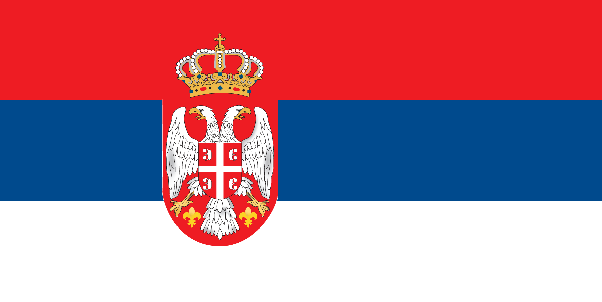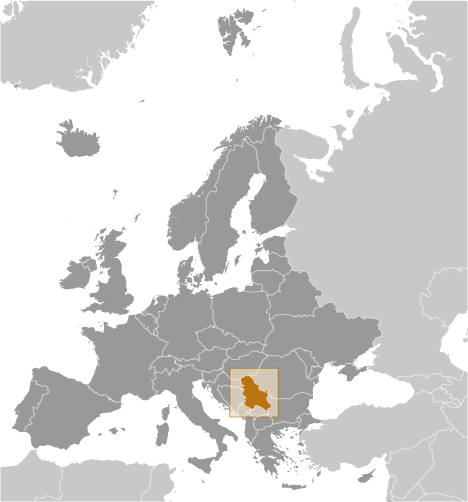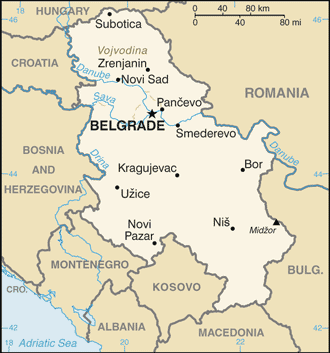The Kingdom of Serbs, Croats, and Slovenes was formed in 1918; its name was changed to Yugoslavia in 1929. Various paramilitary bands resisted Nazi Germany's occupation and division of Yugoslavia from 1941 to 1945, but fought each other and ethnic opponents as much as the invaders. The military and political movement headed by Josip "TITO" Broz (Partisans) took full control of Yugoslavia when German and Croatian separatist forces were defeated in 1945. Although Communist, TITO's new government and his successors (he died in 1980) managed to steer their own path between the Warsaw Pact nations and the West for the next four and a half decades. In 1989, Slobodan MILOSEVIC became president of the Republic of Serbia and his ultranationalist calls for Serbian domination led to the violent breakup of Yugoslavia along ethnic lines. In 1991, Croatia, Slovenia, and Macedonia declared independence, followed by Bosnia in 1992. The remaining republics of Serbia and Montenegro declared a new Federal Republic of Yugoslavia (FRY) in April 1992 and under MILOSEVIC's leadership, Serbia led various military campaigns to unite ethnic Serbs in neighboring republics into a "Greater Serbia." These actions led to Yugoslavia being ousted from the UN in 1992, but Serbia continued its - ultimately unsuccessful - campaign until signing the Dayton Peace Accords in 1995. MILOSEVIC kept tight control over Serbia and eventually became president of the FRY in 1997. In 1998, an ethnic Albanian insurgency in the formerly autonomous Serbian province of Kosovo provoked a Serbian counterinsurgency campaign that resulted in massacres and massive expulsions of ethnic Albanians living in Kosovo. The MILOSEVIC government's rejection of a proposed international settlement led to NATO's bombing of Serbia in the spring of 1999 and to the eventual withdrawal of Serbian military and police forces from Kosovo in June 1999. UNSC Resolution 1244 in June 1999 authorized the stationing of a NATO-led force (KFOR) in Kosovo to provide a safe and secure environment for the region's ethnic communities, created a UN interim Administration Mission in Kosovo (UNMIK) to foster self-governing institutions, and reserved the issue of Kosovo's final status for an unspecified date in the future. FRY elections in September 2000 led to the ouster of MILOSEVIC, and in December 2000 a broad coalition of democratic reformist parties known as DOS (the Democratic Opposition of Serbia) was elected to parliament. DOS arrested MILOSEVIC in 2001 and sent him to be tried in The Hague for crimes against humanity. (MILOSEVIC died in March 2006 before the completion of his trial.) In 2001, the country's suspension from the UN was lifted. In 2003, the FRY became Serbia and Montenegro, a loose federation of the two republics with a federal level parliament. Widespread violence predominantly targeting ethnic Serbs in Kosovo in March 2004 caused the international community to open negotiations on the future status of Kosovo in January 2006. In May 2006, Montenegro invoked its right to secede from the federation and - following a successful referendum - it declared itself an independent nation on 3 June 2006. Two days later, Serbia declared that it was the successor state to the union of Serbia and Montenegro. A new Serbian constitution was approved in October 2006 and adopted the following month. In February 2008, after nearly two years of inconclusive negotiations, the UNMIK-administered province of Kosovo declared itself independent of Serbia - an action Serbia was powerless to stop, but which it refuses to recognize.
Country Name
Conventional long form:Republic of Serbia
Conventional short form:Serbia
Local long form:Republika Srbija
Local short form:Srbija
Former:People's Republic of Serbia, Socialist Republic of Serbia
Government Type
republic
Capital
Name:Belgrade (Beograd)
Geographic coordinates:44 50 N, 20 30 E
Time difference:UTC+1 (6 hours ahead of Washington, DC during Standard Time)
daylight saving time: +1hr, begins last Sunday in March; ends last Sunday in October
Administrative divisions
167 municipalities (opcstine, singular - opcstina)
Serbia Proper: Belgrade City (Beograd): Barajevo, Cukarica, Grocka, Lazarevac, Mladenovac, Novi Beograd, Obrenovac, Palilula, Rakovica, Savski Venac, Sopot, Stari Grad, Surcin, Vozdovac, Vracar, Zemun, Zvezdara; Bor: Bor, Kladovo, Majdanpek, Negotin; Branicevo: Golubac, Kucevo, Malo Crnice, Petrovac, Pozarevac, Veliko Gradiste, Zabari, Zagubica; Grad Nis: Crveni Krst, Mediana, Niska Banja, Palilula, Pantelej Jablanica: Bojnik, Crna Trava, Lebane, Leskovac, Medveda, Vlasotince; Kolubara: Lajkovac, Ljig, Mionica, Osecina, Ub, Valjevo; Macva: Bogatic, Koceljeva, Krupanj, Ljubovija, Loznica, Mali Zvornik, Sabac, Vladimirci; Moravica: Cacak, Gornkji Milanovac, Ivanjica, Lucani; Nisava: Aleksinac, Doljevac, Gadzin Han, Merosina, Nis, Razanj, Svrljig; Pcinja: Bosilegrad, Bujanovac, Presevo, Surdulica, Trgoviste, Vladicin Han, Vranje; Pirot: Babusnica, Bela Palanka, Dimitrovgrad, Pirot; Podunavlje: Smederevo, Smederevskia Palanka, Velika Plana; Pomoravlje: Cuprija, Despotovac, Jagodina, Paracin, Rekovac, Svilajnac; Rasina: Aleksandrovac, Brus, Cicevac, Krusevac, Trstenik, Varvarin; Raska: Kraljevo, Novi Pazar, Raska, Tutin, Vrnjacka Banja; Sumadija: Arandelovac, Batocina, Knic, Kragujevac, Lapovo, Raca, Topola; Toplica: Blace, Kursumlija, Prokuplje, Zitorada; Zajecar: Boljevac, Knjazevac, Sokobanja, Zajecar; Zlatibor: Arilje, Bajina Basta, Cajetina, Kosjeric, Nova Varos, Pozega, Priboj, Prijepolje, Sjenica, Uzice
Vojvodina Autonomous Province: South Backa: Bac, Backa Palanka, Backi Petrovac, Becej, Beocin, Novi Sad, Sremski Karlovci, Srobobran, Temerin, Titel, Vrbas, Zabalj; South Banat: Alibunar, Bela Crkva, Kovacica, Kovin, Opovo, Pancevo, Plandiste, Vrsac; North Backa: Backa Topola, Mali Idjos, Subotica; North Banat: Ada, Coka, Kanjiza, Kikinda, Novi Knezevac, Senta; Central Banat: Nova Crnja, Novi Becej, Secanj, Zitiste, Zrenjanin; Srem: Indija, Irig, Pecinci, Ruma, Sid, Sremska Mitrovica, Stara Pazova; West Backa: Apatin, Kula, Odzaci, Sombor
Independence
5 June 2006 (from Serbia and Montenegro)
National Holiday
National Day, 15 February
Constitution
adopted 8 November 2006; effective 10 November 2006
Legal system
based on civil law system
Suffrage
18 years of age; universal
Executive branch
Chief of state:President Boris TADIC (since 11 July 2004)
Head of government:Prime Minister Mirko CVETKOVIC (since 7 July 2008)
Cabinet:Republican Ministries act as cabinet
(For more information visit the World Leaders website)
Elections:president elected by direct vote for a five-year term (eligible for a second term); election last held on 3 February 2008 (next to be held in 2013); prime minister elected by the National Assembly
Election results:Boris TADIC elected president in the second round of voting; Boris TADIC received 51.2% of the vote and Tomislav NIKOLIC 48.8%
Legislative branch
unicameral National Assembly (250 seats; deputies elected according to party lists to serve four-year terms)
Elections:last held on 11 May 2008 (next to be held in May 2012)
Election results:percent of vote by party - For a European Serbia coalition 38.4%, SRS 29.5%, DSS-NS 11.6%, SPS-led coalition 7.6%, LPD 5.2%, other 7.7%; seats by party - For a European Serbia coalition 102, SRS 59, DSS-NS 30, SNS 19, SPS-led coalition 20, LDP 13, other 7; note - the seat allocation for the SNS and SRS is in flux because of an ongoing dispute between the parties
Judicial branch
courts of general jurisdiction (municipal courts, district courts, Appellate Courts, the Supreme Court of Cassation); courts of special jurisdiction (commercial courts, the High Commercial Court, the High Magistrates Court, the Administrative Court)
Political Parties and Leaders
Coalition for Sandzak or KZS [Sulejman UGLJANIN]; Democratic Party or DS [Boris TADIC]; Democratic Party of Albanians or PDSh [Ragmi MUSTAFA]; Democratic Party of Serbia or DSS [Vojislav KOSTUNICA]; Democratic Union of the Valley or BDL [Skender DESTANI]; Force of Serbia Movement or PSS [Bogoljub KARIC]; G17 Plus [Mladjan DINKIC]; League of Social Democrats of Vojvodina or LSV [Nenad CANAK]; League of Vojvodina Hungarians or SVM [Istvan PASTOR]; Liberal Democratic Party or LDP [Cedomir JOVANOVIC]; Movement for Democratic Progress or LPD [Jonuz MUSLIU]; New Serbia or NS [Velimir ILIC]; Party of Democratic Action or PVD [Riza HALIMI]; Party of United Pensioners of Serbia or PUPS [Jovan KRKOBABIC]; People's Party or NS [Maja GOJKOVIC]; Roma Party or RP [Srdjan SAJN]; Sanzak Democratic Party or SDP [Resad HODZIC]; Serbian Progressive Party or SNS [Tomislav NIKOLIC]; Serbian Radical Party or SRS [Vojislav SESELJ (currently on trial at The Hague), with Dragan TODOROVIC as acting leader]; Serbian Renewal Movement or SPO [Vuk DRASKOVIC]; Social Democratic Party of Serbia or SDPS [Rasim LJAJIC]; Socialist Party of Serbia or SPS [Ivica DACIC]; Union of Roma of Serbia or URS [Rajko DJURIC]; United Serbia or JS [Dragan "Palma" MARKOVIC]
Political pressure groups and leaders
Obraz (Orthodox clero-fascist organization); 1389 (Serbian national movement)
International organization participation
BSEC, CE, CEI, EAPC, EBRD, FAO, G-9, IAEA, IBRD, ICAO, ICC, ICCt, ICRM, IDA, IFC, IFRCS, IHO, ILO, IMF, IMO, IMSO, Interpol, IOC, IOM, IPU, ISO, ITSO, ITU, ITUC, MIGA, MONUC, NAM (observer), OAS (observer), OIF (observer), OPCW, OSCE, PCA, PFP, SECI, UN, UNCTAD, UNESCO, UNHCR, UNIDO, UNMIL, UNOCI, UNWTO, UPU, WCO, WFTU, WHO, WIPO, WMO, WTO (observer)
Diplomatic representation in the US
Chief of mission:Ambassador Vladimir PETROVIC
Chancery:2134 Kalorama Road NW, Washington, DC 20008
Telephone:[1] (202) 332-0333
FAX:[1] (202) 332-3933
Consulate(s) general:Chicago, New York
Diplomatic representation from the US
Chief of mission:Ambassador Mary WARLICK
Embassy:Kneza Milosa 50, 11000 Belgrade
Mailing address:5070 Belgrade Place, Washington, DC 20521-5070
Telephone:[381] (11) 361-9344
FAX:[381] (11) 361-8230
Flag description
three equal horizontal stripes of red (top), blue, and white - the Pan-Slavic colors representing freedom and revolutionary ideals; charged with the coat of arms of Serbia shifted slightly to the hoist side; the principal field of the coat of arms represents the Serbian state and displays a white bicephalic eagle on a red shield; a smaller red shield on the eagle represents the Serbian nation, and is divided into four quarters by a white cross; a white Cyrillic "C" in each quarter stands for the phrase "Only Unity Saves the Serbs"; a royal crown surmounts the coat of arms










